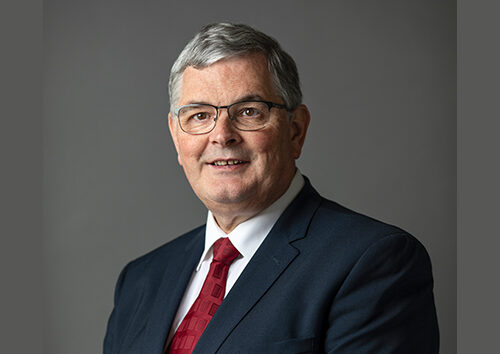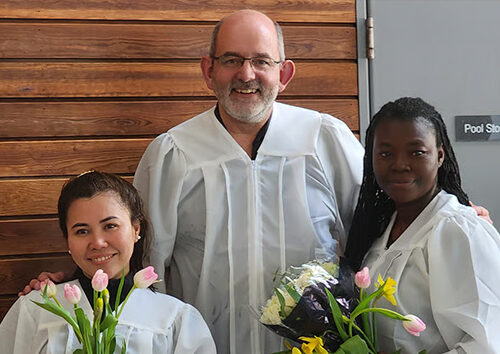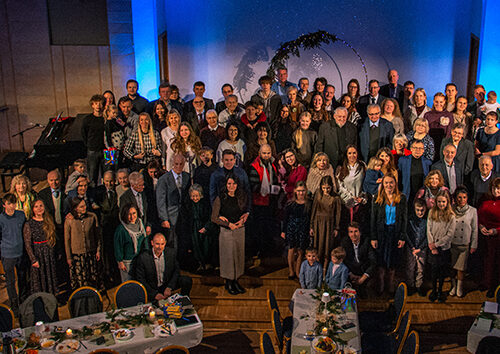18 November 2022 | Budva, Montenegro, [David Neal and Vanesa Pizzuto]
For Pastor Robert Csizmadia, this was his first presentation to Year-End Meeting delegates. Following his election to the role as Trans-European Division (TED) Executive Secretary, at the General Conference Session in June earlier this year, in his opening remarks he took the opportunity to express gratitude and thanks for the work of his predecessor, Pastor Audrey Andersson. He noted that he had stepped into huge shoes, and there are moments at times, when it feels as though he is walking barefoot on rope.
He went on to report the latest key TED membership statistics:
- 88,601 members
- In 1,399 churches and companies
- Representing 11 unions and 3 fields
- In 28 countries and territories
- Among 207,147,000 people
Explaining that the Secretariat role is mostly administrative in nature and depending ever more frequently on the use and analysis of data, Csizmadia emphasised that its core mission is still focussed on serving the Church and helping ensure it is fit for mission.
Membership Profile
According to Csizmadia, if we were to try and describe the typical TED member, she would be female, 49 years old, and married with two or more children. Half of the children, on reaching adulthood, are still church members.
- Of all TED members, 44% are first generation Adventist.
- On average, a long-time church member has been in the church for 26.5 years.
- The average size of TED congregations consists of 50 members.
The Story of the Numbers
Baptismal growth over the past year shows a 29% decline.
There is no change in our ability to keep our young people in the church – still at only a 50% rate.
The TED has received 58% less letters of transfer from members moving into the territory.
Secretariat Report discussion
Responding to the Executive Secretary’s report, the overwhelming theme of the conversation was once again about metrics and how we measure success.
Johanna Klahr (Lay Representative – Swedish Union of Churches)
I want to affirm the necessity for members to discover their spiritual gifts.
Marianne Dyrud (Executive Secretary – Norwegian Union Conference)
As we look at the demographic trends of the TED, particularly from what I see in Scandinavia, there is a growing influx of members coming into the territory – and that is a good thing, but also a challenge as cultures meet. I think we need to consciously decide the type of culture we want in our church; we don’t want fragmentation; we really need to work together to create common fellowship in our churches.
Victor Marley (President, Norwegian Union Conference)
I am very interested in the nurture and retention figures, and remember that there was big focus in 2017 on this. Is there any evidence that the data gathered, is shaping how we do ministry as a church? I hope we can learn something from it.
RC: This is constantly on our agenda.
Lasse Bech (Danish Union Executive Secretary)
Membership figures seem to fluctuate in Denmark every other year, as baptisms are organised biannually. Additionally, the practise of keeping members on the church record long after members have stopped attending, may also contribute to this trend.
RC: It is tragic when we hear ‘missing members’ and have no knowledge as to where they are.
Dr Steve Currow (Principal, Newbold College of Higher Education)
My biggest concern is not what you have presented, but what is beyond what you have reflected on. With the reality that many members are still not coming back after the Covid pandemic, numbers attending are a more serious issue. So, I think we need to be intentional about capturing attendance figures both online and in church.
Dr Kayle De Waal (TED Education Director)
Youth are not interested in coming to a building, but in belonging to a community. For this reason, we need to revise how we do church. Are we willing to see our young people engaged in the community outside of the church building? It is also important that we are open to dialogue with youth who have different perspectives about their faith, and how they express it.
It was Peter Brucker the leadership mentor who said that “Culture eats strategy for breakfast any day.” We need ‘cultural intelligence’. Cultural intelligence is part of our mission. We need to understand the people we are trying to reach with the love and truth of Jesus – their worldview, their concerns and worries, their hope and dreams.
Jaanus-Janari Kogerman (Treasurer, Baltic Union Conference)
If it is the case that we lose 50% of our children – and we could keep them, the reality is that the Trans-European Division membership could have been 180,000 members. We should make greater efforts and concentrate on how we can make the Adventist message relevant to our children and youth living in today’s world.
Karen Porter (GC Secretariat)
I left the church when I was thirteen. I was a deadweight on the church statitstics. If we do not connect with our children in the church in a way that that is stronger and better, then we will continue to lose them. I was a children’s Sabbath School teacher without training. I would have given anything to be able to connect to a hub of experience and materials ready and available to use.
My plea is that we are much more proactive with our ministry to children. The General Conference has created some wonderful resources for teaching children in sabbath school and is about to launch some new resources in the very near future.
Ian Sweeney (TED Field Secretary)
I think our metrics need to be wider than baptism. We need other ways to measure who we are. Being in the room does not mean you are in the room. It is important that we see our church in a greater way than numbers. There is no easy answer to these complex questions.
Alan Redfern (GC Auditing Service, Assistant Director)
In our tradition it is numbers and measurements which often drive our objectives. This is what we strive to do, to increase and better the numbers. I can see a few different models.
- To believe like you and sign up
- The Alcoholics Anonymous model (total and unconditional acceptance) and touch as many lives as you can.
- The internet model – where the world would be a different place if you weren’t there.
I feel it would be good to look at all these models.
Gavin Anthony (President, Icelandic Conference)
These are serious statistics. So, the question remains, – what are we to do about them? How will the process begin to ensure there is action to reverse these statistics? Surely this requires an integrated response – through nurture and retention ministry, Adventist Mission, and Evangelism/church planting department. Even further, do not the leaders of every department care about reaching lost people?
Maureen Rock (TED Stewardship Director)
How do we evangelise and reach our children? It is time to end the silos on this matter!
Jacques Venter (BUC Associate Executive Secretary)
If people make decisions to follow Jesus before they reach 13, they are more likely to stay. But our budgets for children are often negligible. We need to put our money where our mouth is.
Dan Serb (President, Irish Mission)
Behind the numbers there are relationships. To be meaningful, relationships need trust. If people don’t buy into our message for lack of trust, it does not matter how good our programmes are. We need to see how we can facilitate and grow trust. We need to invest time and money in building trust.”
The mood of the discussion demonstrated the determination of TED leaders, to improve the metrics, for the sake of providing a more accurate picture of the commitment level of members to the mission and message of the church. In addition, leaders committed to finding ways to improve retention rates. After the discussion, delegates voted to approve the report.






